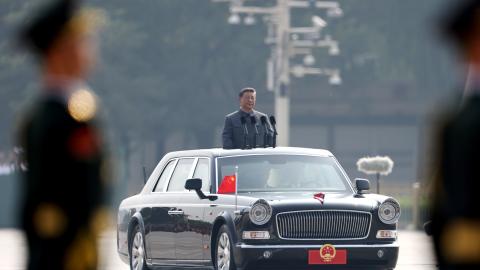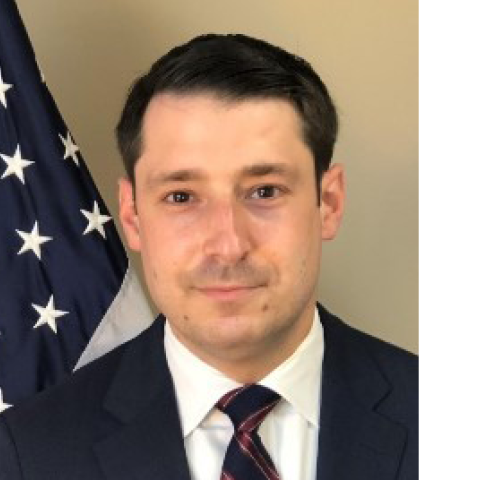What more could our country ask for in a director for the Central Intelligence Agency than Gina Haspel? After Haspel’s confirmation hearing performance, that’s the question every senator considering opposing her nomination needs to answer.
A quick glance down Haspel’s resume shows she has more than enough experience under her belt. She joined the CIA in 1985 and earned award after award for her performance that went above and beyond what was expected. She has been recognized for her “achievement above normal duties,” and for demonstrating “particularly superior innovation, open mindedness.”
She has extensive counterterrorism experience in the field and served in the CIA’s Counterterrorism Center. She was the chief of station for multiple stations and speaks Turkish and Russian.
Unsurprisingly, Haspel has earned the respect from her colleagues. Fifty retired intelligence professionals signed a letter endorsing Haspel's nomination. In it, they wrote: “Those who have served alongside Haspel have only the utmost praise and respect for her. She has broad support from the CIA workforce. Within the U.S. national security community and among our allies around the globe, admiration for her is unsurpassed.”
But there’s something more that goes beyond an impressive resume and professional recommendations. It’s worth reflecting on what kinds of personal sacrifices Americans like Haspel make to take the path she took and the kind of “stuff” a person like her is made of. The public may never know in detail what amazing feats Haspel accomplished to distinguish herself and earn all those awards, but considering the environment she was in and the all-consuming clandestine roles she played, we can surmise it required strength and calm under pressure, resolve, self-sacrifice, and extraordinary courage and competency to put that courage to exceptional use.
Her courage is the kind motivated by a deep sense of patriotism — loyalty to her country and its defense. It’s the kind of courage that marks U.S. intelligence operatives who serve their careers almost always, especially if all goes well, in total anonymity. They risk everything, at great personal cost, and they do it all without fame, let alone recognition. Haspel has done all of that, in a male-dominated field, without asking for favor or exception, and she has excelled.
But all of that, all of that, is still not good enough for some senators.
For those still opposing her nomination, or at the very least highly skeptical of it, at issue is her participation in the detention and interrogation program that CIA operated immediately after the Sept. 11 attacks. In 2002, Haspel oversaw a CIA prison in Thailand. While there, aggressive interrogation techniques were used, including on Abd al-Rahim al-Nashiri, the war criminal who orchestrated the 2000 bombing of the USS Cole that killed 17 American sailors and injured another 39. Keep in mind there were 293 sailors on that destroyer, and no doubt al-Nashiri intended the death toll to be much higher.
The sessions CIA employees carried out at the prison were videotaped and in 2005 ordered by CIA leadership that they be destroyed. When Sen. Dianne Feinstein, D-Calif., one of Haspel’s harshest critics, asked her about her possible involvement in the destruction of the recordings, Haspel denied her involvement. Still, Haspel offered a defense of their destruction, citing the potential danger in revealing the identities of the officers in the recordings.
Haspel has repeatedly made the case she always followed U.S. law when performing her duties at the CIA. Regardless, the CIA has since shelved that particular interrogation program, and Haspel has sought to assure senators she will not reinstate it. It’s in the past.
But the “torture” issue just isn’t going to go away. At root, it’s due to a blinding moral relativism that plagues a shameful number of elected officials, and prevents them from appreciating just how morally upright Haspel’s CIA service has been.
Just watch the exchange between Sen. Jack Reed, D-R.I., and Haspel. He asks her about a hypothetical situation where a U.S. operations officer is captured by a terrorist and waterboarded. He wants to know if Haspel would disapprove of this.
Her answer, with a look of incredulity, was this:
"Senator, I would never obviously support inhumane treatment of any CIA officers. We’ve lost CIA officers over the years to terrorists. I just gave an example. Khalid Sheikh Mohammed personally killed a Wall Street Journal correspondent and filmed that. I don’t think there’s any comparison between CIA officers serving their country, adhering to U.S. law, and terrorists who, by their very definition, are not following anybody’s law."
And this is what Haspel and her colleagues have a handle on that seems to elude Reed and some of his colleagues: There is no equivalence between the terrorist and the CIA officer. The cause of CIA officers is just, and the cause of Islamist terrorists seeking to destroy the U.S. is unjust. This is objectively true.
Our entire military posture is designed to protect and defend the sovereignty of ally nations and our own, to protect our innocent people and their property from aggression. We go to great lengths to protect the lives of the enemy’s civilians. The entire strategy of terrorists is to target civilians in the most painful, shocking ways to maximize pain and suffering. They seek to conquer through human suffering and horror, and, as Haspel said, by definition, they are lawless. Their cause is evil.
When U.S. intelligence officers have this kind of enemy in their custody, one who was captured on the battlefield while seeking to kill Americans and our allies, our intelligence officers must have the legal powers to extract intelligence from those enemy combatants to thwart the next attack and protect innocents.
Put another way: A terrorist inflicting pain on an American hostage would be necessarily immoral and unjust. A U.S. official inflicting pain on an unlawful enemy combatant, even with the same technique used by the hypothetical terrorist, could be moral and just.
Haspel’s confirmation hearing made a few things very clear. Moral relativism poses a real danger to the kind of work our intelligence professionals engage, and really to American national security policy in general. Also, our elected officials need to spend some more time meditating on the suffering of the loved ones of those Americans killed in brutal acts of terrorism. Want an example of “torture”? There you have it.
Haspel is a brilliant intelligence professional, an inspiration to all Americans, and deserves an overwhelming bipartisan vote in favor of her confirmation. But if enough senators can’t recognize the difference between CIA officers and terrorists, maybe we don’t deserve her.
















